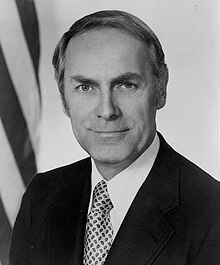Doug Barnard Jr.: Difference between revisions
added Category:Phi Delta Theta members using HotCat |
|||
| Line 105: | Line 105: | ||
[[Category:20th-century American lawyers]] |
[[Category:20th-century American lawyers]] |
||
[[Category:Phi Delta Theta members]] |
[[Category:Phi Delta Theta members]] |
||
[[Category:20th-century members of the United States House of Representatives]] |
|||
Latest revision as of 00:25, 8 December 2024
This article needs additional citations for verification. (January 2018) |
Doug Barnard Jr. | |
|---|---|
 | |
| Member of the U.S. House of Representatives from Georgia's 10th district | |
| In office January 3, 1977 – January 3, 1993 | |
| Preceded by | Robert Grier Stephens Jr. |
| Succeeded by | Don Johnson Jr. |
| Personal details | |
| Born | Druie Douglas Barnard Jr. March 20, 1922 Augusta, Georgia |
| Died | January 11, 2018 (aged 95) Augusta, Georgia |
| Political party | Democratic |
| Spouse | Naomi Holt "Nopi" Bernard |
| Profession | Attorney, banker |
| Military service | |
| Branch/service | |
| Years of service | 1943 – 1945 |
| Battles/wars | World War II |
Druie Douglas Barnard Jr. (March 20, 1922 – January 11, 2018) was a United States congressman from Georgia.
Biography
[edit]Barnard attended the Richmond County public schools and graduated from the Academy of Richmond County (Augusta, Georgia) in 1939. He attended Augusta College from 1939 to 1940, then graduated in 1943 with a Bachelor of Arts from Mercer University in Macon, where he became a member of the Phi Delta Theta fraternity. He served in the United States Army during World War II from 1943 to 1945 and became a technician two.[1][2] He served in the 57th Finance Disbursing Unit and was stationed at Fort Benjamin Harrison, Indianapolis, Indiana as well as in the European theatre of World War II in England, France and Belgium.[2] After serving in the military, he returned to Georgia and earned an Bachelor of Laws from the Walter F. George School of Law at Mercer University in 1948.
From 1948 to 1962, Barnard engaged in the banking profession, primarily at the Georgia Railroad Bank, a former local Augusta banking institution. He was executive secretary to Georgia Governor Carl Sanders from 1963 to 1966, and a board member of the Georgia State Department of Transportation from 1966 to 1976. He was a Democrat.
Barnard was a delegate to the Georgia State Democratic convention in 1962 and a delegate to the 1964 Democratic National Convention. He served in the United States House of Representatives from 1977 to 1993. On March 22, 1980, he addressed a crowd estimated to be between 200 and 300 people where he unveiled the Georgia Guidestones monument in Elberton.[3] He explained that the monument was to guide future generations and that it should make Americans try to ecologically preserve the environment.[3]
Doug Barnard was an active member of First Baptist Church in Augusta. He was married to Naomi Holt "Nopi" Bernard, a poet. Barnard died on January 11, 2018, in Augusta, Georgia.[4] He had two daughters, one son, and 7 grandchildren.
Legacy
[edit]Georgia State Route 56 Spur, in Augusta, was named in his honor as the Doug Barnard Parkway.
See also
[edit]References
[edit]- ^ Michael Barone and Grant Ujifusa (1991). The Almanac of American Politics 1992. Washington, D.C. pp. 324–325. ISBN 0-89234-051-7.
{{cite book}}:|work=ignored (help)CS1 maint: location missing publisher (link) - ^ a b "Doug Barnard, Jr. Collection Biographical Information", Veterans History Project website, American Folklife Center, Library of Congress, collection AFC/2001/001/72971, lasted edited November 6, 2019. Retrieved May 30, 2021.
- ^ a b "Eberton Unveils Mystery Stones". The Atlanta Constitution. United Press International. March 23, 1980. Archived from the original on July 7, 2022. Retrieved July 7, 2022.
- ^ "Former Georgia congressman Dooug Barnard dies at 95". Archived from the original on 2018-01-12. Retrieved 2018-01-12.
External links
[edit]- Biography at the Biographical Directory of the United States Congress
- Appearances on C-SPAN
- "Doug Barnard, Jr." interview at the Veterans History Project
- 1922 births
- 2018 deaths
- Politicians from Augusta, Georgia
- United States Army soldiers
- Military personnel from Georgia (U.S. state)
- Augusta State University alumni
- United States Army personnel of World War II
- Georgia (U.S. state) lawyers
- Mercer University alumni
- Academy of Richmond County alumni
- Democratic Party members of the United States House of Representatives from Georgia (U.S. state)
- 20th-century American lawyers
- Phi Delta Theta members
- 20th-century members of the United States House of Representatives
